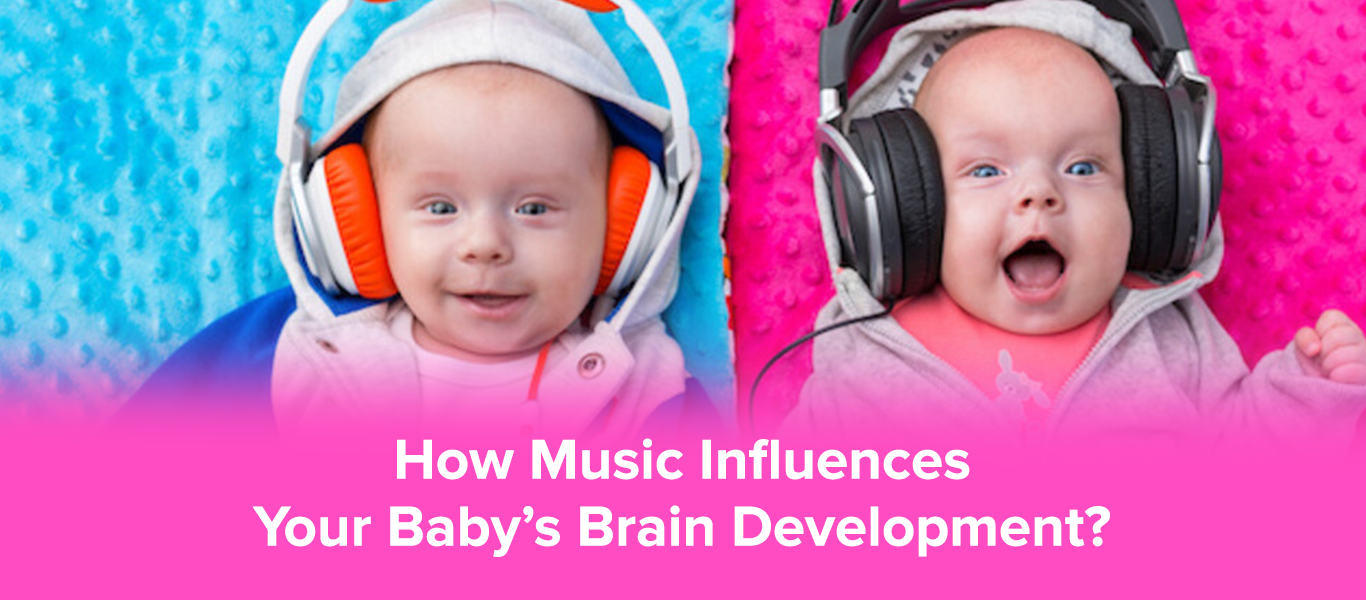How Music Influences Your Baby’s Brain Development?
Oct 31, 2025

Music is more than just sound. Music is a language that speaks directly to the developing brain. From gentle lullabies to rhythmic beats, every note stimulates areas of your baby’s brain responsible for memory, attention, and emotional growth.
Studies now show that listening to and making music creates real, measurable changes in the brain. It activates both the auditory cortex (for sound processing) and the prefrontal cortex (for planning and focus). And as a bonus, it releases endorphins, the “happy hormones” that make babies feel calm, connected, and joyful.
How Music Shapes Your Baby’s Brain?
Neuroscientists studying infant brain activity have discovered that music exposure can shape the way babies think, feel, and interact.
When babies listen to music, the parts of the brain responsible for language, rhythm, and emotion start to form stronger connections. In one study by the Institute of Learning and Brain Sciences, researchers found visible changes in babies’ brain regions after listening to simple tunes. It is the same regions that later help them understand speech and language.
But it doesn’t stop there. Music also encourages social behavior. Babies who experience musical play tend to be more helpful, cooperative, and emotionally aware as they grow. Music helps them not only learn sounds. But it also connect with people.
Listening vs. Making Music: The Dual Power
Listening to music is beneficial, but creating it is even more powerful. When babies clap, tap, or play with musical toys, they develop fine motor control and coordination.
Making music activates multiple brain regions at once:
Motor skills for gripping and moving.
Linguistic skills for sound and rhythm patterns.
Mathematical precision through timing and sequencing.
Creativity and imagination as they explore new sounds.
This multi-sensory learning builds a stronger bridge between the two sides of the brain, improving communication between them. As these neural pathways strengthen, babies become more responsive, observant, and expressive.
The Long-Term Benefits of Music Exposure
Even short, daily interactions with music can spark lifelong learning advantages. According to neuroscientist Dr. Graham Welsh, music positively influences early literacy, numeracy, coordination, and emotional health.
Here are some key benefits music offers your child:
Boosts mood and reduces stress: Music helps babies relax, sleep better, and express emotions safely.
Encourages empathy and bonding: Dopamine and oxytocin (the “love and trust” hormones) are released during musical play, promoting sharing and connection.
Improves focus and memory: Regular exposure sharpens concentration and problem-solving skills.
Enhances creativity and vocabulary: Singing helps babies learn new words, sounds, and emotional expressions.
Supports early learning: Rhythm and melody stimulate spatial intelligence (a foundation for math, design, and science skills later in life.)
Bringing Music into Your Baby’s World
You don’t need fancy instruments to give your baby the gift of music. Everyday play can become a joyful musical experience.
Play soft tunes while your baby rides their favorite Dashbabyrides toy.
Encourage gentle clapping or tapping along with songs.
Use musical ride-on toys or sound-based playthings to combine rhythm with movement.
Sing simple songs during bath time or bedtime.
Each musical moment is not just play but also brain-building magic in motion.
Create a Joyful Soundtrack for Early Learning
At Dashbabyrides, we believe playtime should nurture both happiness and growth. Our range of safe, fun, and musical ride-on toys are designed to support sensory learning while keeping your baby smiling.
Let every ride be a rhythm of discovery.
Shop Now

